CALL YOUR TRUSTED LOCAL EXPERTSSM
Air Conditioner Replacement Costs in Chicago
Let our highly trained professionals install your new air conditioning system today.
2024 Air Conditioner Replacement Costs: The Ultimate Guide
The need for efficient, cost-effective air conditioner replacement is in higher demand each year. With rising temperatures and increasing interest in sustainable living, homeowners are exploring ways to stay cool without breaking the bank.
We’ve compiled this guide to offer an in-depth look at air conditioner replacement costs in 2024, providing you with the knowledge and insights to make an informed decision.
If your home cooling system is struggling, upgrading or installing a new AC unit can make a significant difference, and budgeting for replacement before a total system failure is essential.
Get up-to-date information on current market rates for air conditioner replacement costs and tips on how to secure the best AC deals in 2024. Stay ahead of the curve with insights into future trends in air conditioning, including smart systems, eco-friendly refrigerants, and innovations in cooling technology.
If you are looking for Chicago air conditioner replacement costs, contact Four Seasons Heating & Cooling near you at 866-444-2404 for a quote on a new air conditioner installation today.
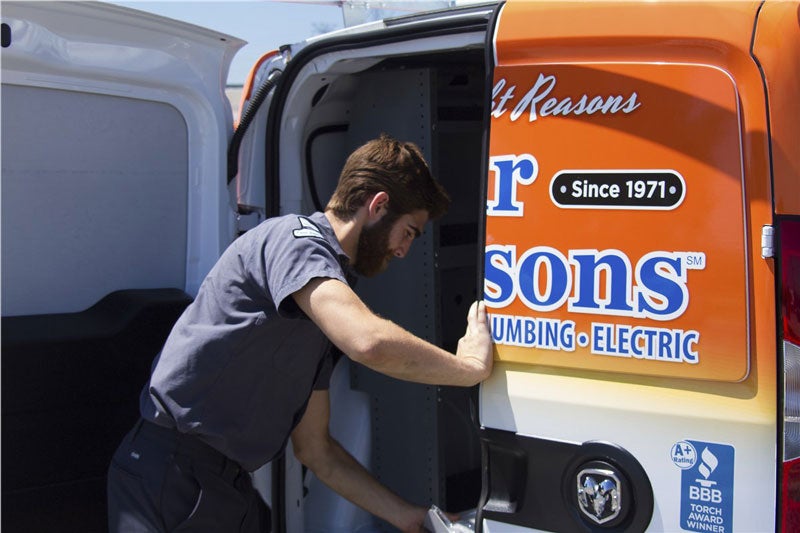

What Is the Average Cost of a Chicago Air Conditioner Replacement?
The average cost for an air conditioner replacement in Chicago ranges from $5,000-$9,000 on the low-end, $9,000-$14,000 in the mid-range, and upwards of $15,000-$34,000 on the high-end. Generally, homeowners can expect to pay anywhere from $3 to $7 per square foot for AC unit replacement costs.
Ensuring your home maintains a comfortable temperature throughout the year requires thoughtful consideration. Investing in a new HVAC system is a smart long-term decision, but the cost of replacing an AC unit depends on a number of factors.
Different homes receive different estimates because all homes have different cooling needs.
Let’s delve into the factors affecting the cost to replace AC units, including system installation expenses, the size of your home, and more.
Top Factors Affecting Chicago Air Conditioner Replacement Costs
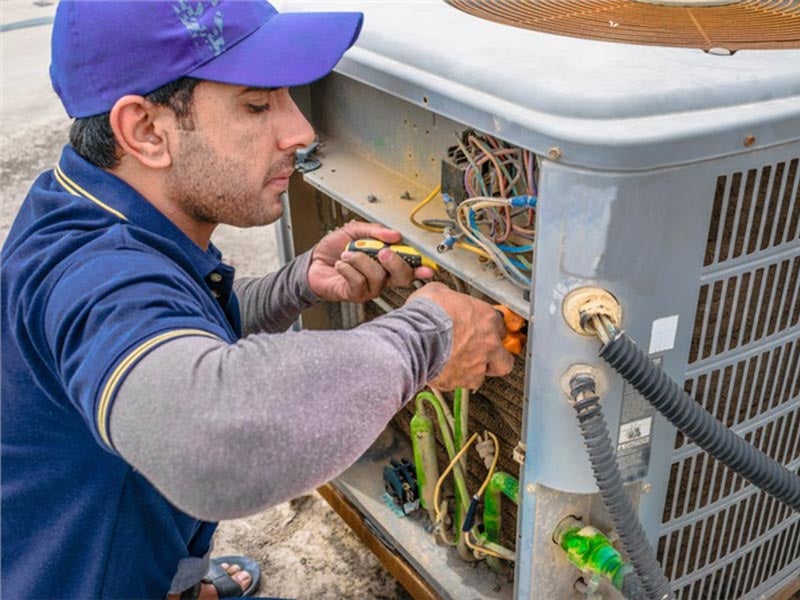
Several factors influence the cost of replacing an air conditioner, including the system type, size, brand, and installation complexity. Navigating these can help you budget effectively.
Our licensed technicians use several factors to determine which AC system will work best for your family, including but not limited to:
- The number of vents in your home
- The height of your ceilings
- The overall square footage inside your home
This analysis is referred to as a Manual J load calculation, and it’s necessary when purchasing a new AC unit for your home.
The size of your home directly impacts the AC system's capacity required to efficiently cool the space. An undersized unit will struggle to maintain desired temperatures, whereas an oversized one might lead to frequent cycling, wasting energy and increasing utility bills.
Cost Breakdown for AC Replacement
Get a detailed breakdown of what goes into the cost of an air conditioner replacement, including equipment, labor, and any additional components or services that may be necessary.
Comparing Air Conditioner Types and Their Costs
Air conditioners and their cooling abilities can be varied. Typically, air conditioners are customized by size and priced differently based on their weight. A one-ton A/C, for example, won’t cost the same as a four-ton unit.
To find the best system for your home, it’s important to start at the beginning by exploring the pros and cons of different air conditioner types, including their associated costs, to find the best fit for your home and budget.
Brand of AC Unit
The choice of brand for your AC system influences not only the upfront cost but also its long-term performance and ongoing energy costs. Selecting a reputable brand ensures reliability, energy efficiency, and overall satisfaction with your investment.
When Chicago homeowners ask themselves, how much does it cost to replace an AC unit, it's important to consider factors like durability, warranty coverage, and ongoing energy costs when making this decision. By opting for a trusted brand, you're not just purchasing a product; you're investing in comfort and peace of mind for years to come.
Before you make a decision, talk to your nearby HVAC expert about which brands are best for your area, and your home.
Here are a few brands you might want to think about:
- American Standard®
- Lennox®
- Amana®
- Frigidaire®
- Coleman®
Opting for a renowned and trusted brand ensures a higher likelihood of performance consistency and reliability over time. Additionally, exploring manufacturers that offer comprehensive warranties or extended coverage can furnish homeowners with added assurance and potentially avoid future expenses associated with repairs or replacements.
The Size of Your Illinois House
The size of your home directly impacts the HVAC system's capacity required to efficiently cool the space. An undersized unit will struggle to maintain desired temperatures, whereas an oversized one might lead to frequent cycling, wasting energy and increasing utility bills.
Typically, homeowners should budget between $3 to $7 per square foot for HVAC systems, ensuring adequate coverage for their property's dimensions.
Existing or New Ductwork
When calculating the cost to replace AC units, it's essential to consider expenses beyond just the basic unit and labor. Two key factors that can influence overall costs are ductwork and potential modifications:
- Ductwork plays a significant role, particularly if your home already has ducts in good condition. This situation might simplify the installation process, potentially reducing costs. However, if the existing ducts are incompatible with the new system, modifications will be necessary.
- Typically, ductwork costs between $10 and $20 per linear foot, with an average requirement ranging from 50 to 200 feet. Factor in these additional expenses when budgeting for air conditioner replacement costs to ensure a seamless and cost-effective process.
We also offer professional service and installation on all Chicago ductless cooling & heating and systems.
Project Complexity
When determining what is the average cost of an air conditioner replacement, it's essential to consider project difficulty as a primary factor.
The complexity of the installation project, including structural requirements, potential electrical modifications, and any obstacles encountered, can significantly impact AC unit replacement costs.
Moreover, difficulties in accessing certain areas of the property or opting for additional aesthetic features, such as concealing the unit with a decorative fence, can further add to the overall expenditure.
By carefully considering these factors, homeowners can better anticipate AC replacement costs.
Energy Efficiency and Savings: SEER Value
Investing in an energy-efficient air conditioner can lead to significant savings. Learn about SEER ratings, government rebates, and how to calculate your long-term savings.
SEER, short for Seasonal Energy Efficiency Ratio, serves as a metric for evaluating the efficiency of air conditioners or heat pumps. A heightened SEER value signifies enhanced energy efficiency, offering a promising potential to alleviate the burden on utility bills over time.
Despite the possibility of a steeper initial investment for units boasting higher SEER ratings, the long-term benefits are substantial. By curbing energy consumption and slashing utility expenses, these advanced systems ultimately prove to be a wise and cost-effective choice for homeowners in Chicago aiming to optimize their comfort without compromising their budget.
An improperly-sized A/C unit can lead to higher energy bills, a shorter lifespan for your unit, the need for more frequent AC repairs, air conditioning tune up, and high humidity in your home. By getting an estimate from a qualified, licensed technician, you will be armed with the information necessary to make sure you’re investing in the right A/C unit for your home. Our A+ BBB accreditation and numerous industry awards are testaments of our commitment to earning 100% customer satisfaction and a guarantee on every job.
Additional Air Conditioning Replacement Cost Factors to Consider
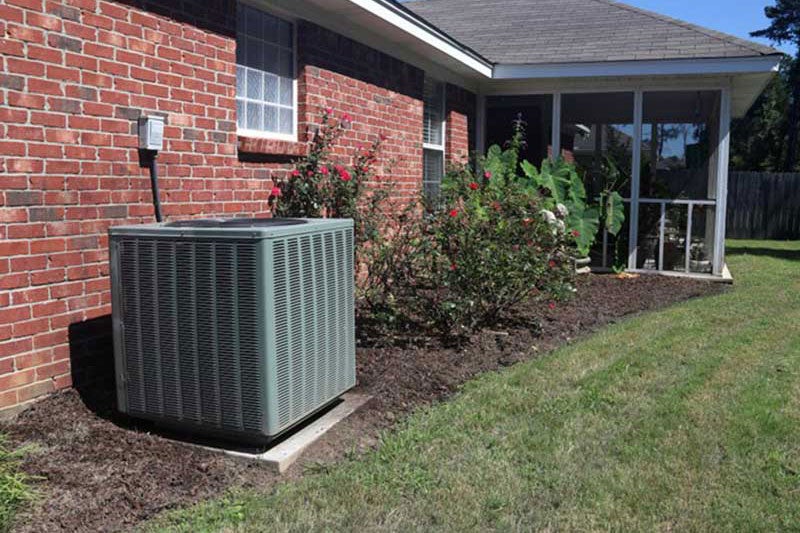
When determining if you need to replace your air conditioner and the cost to replace an AC unit, it’s important to consider additional costs and savings opportunities that might not be obvious at the start of your research.
Here are some of the most common add-on items to plan for when you’re calculating your average cost to replace an AC unit, in addition to a few ways to potentially save money on your new AC installation.
Insulation: Making sure your home is well-insulated can help your heating and cooling systems work better, which can save you money on energy bills. If your home isn't well-insulated, you might end up paying more for energy.
Thermostats & Additional Hardware: Digital, programmable thermostats are handy devices that can help you cut down on energy consumption. They work by giving you more precise control over your heating and cooling system. This means you can adjust the temperature exactly how you want it, which can lead to savings on your energy bills.
Airflow: It's important to have good airflow in your home to keep it comfortable. If there are leaks or gaps in your ducts, you might notice some areas are hotter or colder than others. Contractors can check and adjust your ducts to make sure air flows properly.
Refrigerant: Your HVAC system needs refrigerant to cool the air. If it doesn't have enough, it might use more energy and make your home feel more humid. A professional technician can check and refill the refrigerant if needed.
Warranty: New air conditioners usually come with a warranty from the manufacturer, which can last anywhere from 5 to 15 years. This warranty can help cover costs if something goes wrong with your system.
Winter Installation: Installing a new HVAC system in the winter might save you money, as professionals are often less busy during this time.
Permits: Depending on where you live, you might need a permit or inspection for your HVAC installation. Checking with your local government can help you understand what's required.
Location: The cost of installing central air can vary depending on where you live. Hotter climates might have higher costs, but labor costs and other factors can also play a role. It's a good idea to get quotes from local installers to find out what to expect.
Hazardous Materials: If your ducts are old or haven't been cleaned in a while, they might contain mold or asbestos. Dealing with these materials can add to the cost of your project. Professional help might be needed to remove asbestos, while mold might require cleaning or replacement of the ducts. These issues should be addressed to ensure your home's safety and the success of your HVAC project.
Tax Credits & Rebates: Many states offer local utility rebates or government tax credits if you opt for a new HVAC system. And some product manufacturers offer rebates for purchasing their products. For instance, at Four Seasons, you may be eligible for rebates if you opt for a full HVAC installation along with a thermostat. These digital, programmable thermostats offer precise control over your system, helping you save on energy usage.
Financing and Payment Options: Explore various financing and payment options to manage the cost of your air conditioner replacement without compromising on quality. If you want to pay for your new air conditioner over time, there are many choices for you. Partial payment of cash/check and balance with financing can be an option as well.
If you are looking for Chicago air conditioner replacement costs, contact Four Seasons Heating & Cooling at 866-444-2404 for a quote on a new air conditioner installation today.
How to Choose the Right Air Conditioner for Your Home
Choosing the right air conditioner involves assessing your cooling needs, considering energy efficiency, and balancing your budget. This section will guide you through making the best choice for your home.
Many homeowners believe bigger A/C units cool the home faster than smaller units. This is a common misconception. Bigger is not always better!
Your family needs a unit sized specifically for your home. If you purchase a unit that is too large or too small, you can face a number of complications with your entire HVAC system.
Typically, larger units come with a heftier price tag compared to their smaller counterparts due to the increased need for installation materials and labor. Opting for a unit that's too small might leave you sweating through the summer, unable to adequately meet your cooling needs.
On the other hand, an oversized unit could result in inefficiencies and unnecessary expenses, as it works harder than what is required for the space. Therefore, striking the right balance and selecting the appropriately sized unit is paramount for ensuring optimal performance and cost-effectiveness in the long run.
The A/C Installation Process
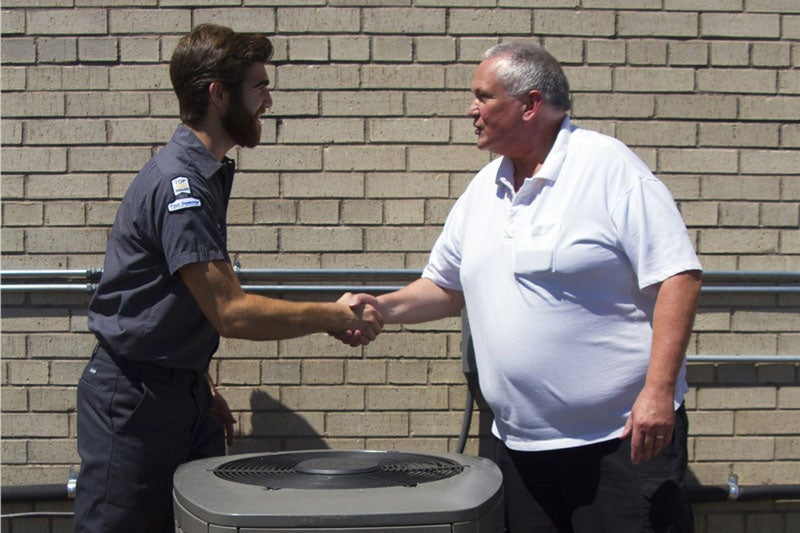
Understanding the installation process can help prepare you for what to expect, ensuring a smooth and efficient upgrade to your home's cooling system.
Air conditioning systems installation has the potential to increase your property value. As a home buyer, would a smoothly operating and energy-efficient central A/C system setup be a desirable asset to you?
It is to most prospective home buyers, offering both elevated comfort and cost savings on utilities.
However, it's important to understand that the appreciation of your home's value hinges on several factors, including the efficiency and age of your HVAC system, alongside the overall condition of the property.
Taking the time to conduct your due diligence and talk with a few different A/C installation experts near you will not only help you better understand all of your options, but also be able to answer the, “how much does it cost to replace an AC unit” question.
There are two main types of central air conditioning systems: split and packaged.
Split AC systems are the usual choice for most homes, while packaged AC systems are more compact and often pricier. Both systems can keep your house cool, but they have different costs and installation requirements.
Another option is bundling your furnace and AC together, in what’s called a Packaged HVAC system, which can save space in small homes, but often not the best choice for everyone.
Split AC System
This type of system is a good choice if you already have a furnace and ducts in your home and just want to add air conditioning.
With a split system, you'll have an outside condensing unit and an evaporator and fan that sit on top of your furnace, utilizing its air handler and ducts. This setup is known for its quiet operation, since the noisy components are located outside the living area.
If your furnace is relatively new and your ducts are less than 15 years old, this option can be a cost-effective way to upgrade your home's cooling system. However, if you don't have a furnace and ducts or if they need replacement, you might want to consider an all-in-one package to streamline the installation process and reduce additional expenses.
Packaged AC Unit
Packaged units are less common but offer advantages for homes with limited space or for those adding AC to an existing furnace. Unlike split systems, packaged units consist of a single outdoor unit, making them more compact.
However, this design also means that they require more maintenance since the entire system is exposed to the elements.
At Four Seasons Heating & Cooling, we're here to assist you with all your air conditioning needs, from replacement to installation, ensuring your home stays cool and comfortable year-round.
HVAC Packaged Units
HVAC packaged units, which combine a furnace and air conditioner in one unit, are convenient because they integrate all the necessary components into one outdoor unit. These systems, though they use ducts, are often easier to install due to their single-unit design.
How Much Does it Cost to Replace AC Units? Ask a Professional Near You
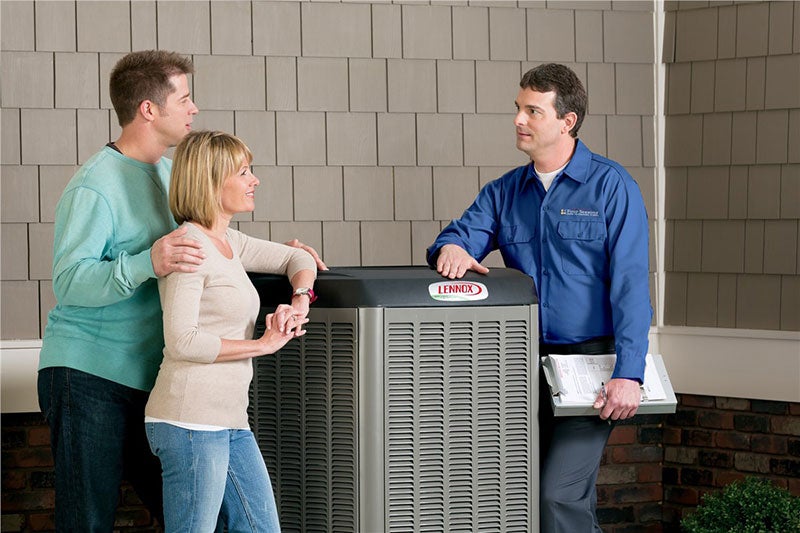
To find out exactly how much it will cost to replace your air conditioning system, we encourage you to schedule a visit from one of our skilled technicians who can give you a range of accurate estimates based on your home, cooling needs, and budget.
When you're ready to talk about what could work best for your house, we're eager to chat with you!
At Four Seasons, our primary goal is to exceed your expectations in every way possible, from the first phone call to our ongoing maintenance visits. That means we’re not just selling you a new A/C system, we’re making sure you understand all of your options available, and make sure you understand exactly what you're getting every step of the way.
We're here to assist you in finding the perfect heating, ventilation, and air conditioning (HVAC) setup and products that suit your needs, your house, and your comfort.
Here at Four Seasons, we also have an easy and convenient way to cover AC replacement costs for Chicago area homeowners. If you are wondering, "How much does a new AC unit cost?", give our team a call for a free quote.
If you are looking for Chicago air conditioner replacement costs, contact Four Seasons Heating & Cooling at 866-444-2404 for a quote on a new air conditioner installation today.
Air Conditioning Replacement Cost FAQs
- How often should I replace my air conditioner?
- Air conditioners typically stick around for about 10 to 20 years, with most hanging in there for about 15 years. But here's a nugget of wisdom: some experts suggest that as long as your AC is chugging along smoothly, there's no urgent need to swap it out. Instead, you might want to consider upgrading to one with a higher SEER rating. This move could end up saving you some cash in the long run by making your cooling system more efficient.
- What is the most energy-efficient air conditioner in 2024?
- According to a recent 2024 Time Magazine article, the most energy-efficient window air conditioner is the Midea U-Shaped 12,000 BTU Air Conditioner. For central air units, the most energy efficient AC is the one that best cools your home with the highest energy efficiency.
- Can I install a new air conditioner myself?
- For a window unit yes, but for a central air conditioner, you probably shouldn’t. It's better to leave it to a professional who has the right skills and license to ensure everything is done correctly. Plus, in some places, you need permits to install central air or make changes to your HVAC system. So, it's always smarter to hire a pro for this job.
- How can I qualify for government rebates on my AC replacement?
- Learn more about the Illinois Energy Star® Appliance Rebate Program. And search by zip code to find rebates and special offers near you on ENERGY STAR certified products.
- What should I do if my new AC isn't cooling properly?
- If your air conditioner is blowing out warm air instead of cool, there could be a few reasons why. From thermostat malfunction, to dirty filters, to coil issues, there could be any number of reasons. That’s why it’s always best to enlist the help of an experienced, licensed technician if your AC isn't cooling your home properly.
Contact a Top-Rated Air Conditioning Replacement Services Company Near You in Chicago
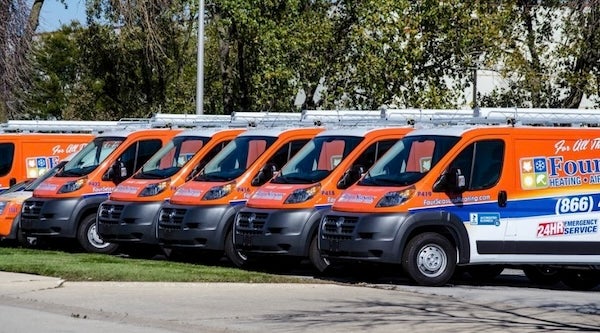
Replacing your air conditioner in 2024 is an investment in your home's comfort and efficiency.
With the right information and planning, you can navigate the replacement process smoothly and enjoy a cooler, more comfortable home. Stay informed, choose wisely, and prepare to beat the heat with your new air conditioning system.
If you are looking for Chicago air conditioner replacement costs, contact Four Seasons Heating & Cooling at 866-444-2404 for a quote on a new air conditioner installation today.
Explore Options
Explore our AC Replacement Guide
- 2024 Air Conditioner Replacement Costs
- What is the Average Cost of an AC Replacement?
- Top Factors Affecting Air Conditioner Replacement Costs
- Cost Breakdown for AC Replacement
- Additional Air Conditioning Replacement Cost Factors
- How to Choose the Right Air Conditioner for Your Home
- The A/C Installation Process
- How Much Does it Cost to Replace AC Units?
- Air Conditioning Replacement Cost FAQs
- Contact Us


